Demystifying Charging Procedures in the UK: A Comprehensive Overview
Welcome to SQE Criminal Law & Practice Law UK! As expert solicitors, writers, and SEO professionals, we are passionate about providing insightful and informative content to help you navigate the legal landscape. In this comprehensive blog post, we will delve into the intricate world of charging procedures in the UK criminal justice system.
The Importance of Understanding Charging Procedures
Charging procedures play a pivotal role in the criminal justice system, serving as the initial step towards the legal process. Having a comprehensive understanding of these procedures is essential for both legal professionals and individuals facing criminal charges.
Before we dive deeper into the subject matter, it’s important to note that SQE Criminal Law & Practice Law UK provides excellent courses for aspiring solicitors seeking to enhance their knowledge of criminal law. Check out our SQE 1 Preparation Courses and SQE 2 Preparation Courses to take your legal career to the next level.
Understanding the Basics of Charging Procedures
Charging procedures begin when a criminal offense occurs and the police launch an investigation. Once the police gather evidence, they submit a file to the Crown Prosecution Service (CPS) for review. The CPS evaluates the evidence and determines whether there is sufficient evidence to proceed with a prosecution. This process, known as charging, involves the formal accusation of an individual or entity for a criminal offense.
If you want to test your knowledge of criminal law concepts and procedures, make sure to check out our SQE 1 Practice Mocks FLK1 FLK2 and SQE 1 Practice Exam Questions articles. They are excellent resources to assess your understanding and identify areas for improvement.
The Different Types of Charges
There are various types of charges that can be brought against an individual or entity, depending on the nature of the offense. Common examples include:
- Murder
- Theft
- Assault
- Drug offenses
It’s crucial to note that different charges carry different penalties, and the severity of the offense will impact the charging process. If you are interested in staying up to date with the latest SRA SQE exam dates, visit our SRA SQE Exam Dates page to ensure you are well-prepared for the examination.
The Role of Solicitors in Charging Procedures
Solicitors play a vital role in charging procedures. They provide legal advice and representation to individuals facing criminal charges. A solicitor can guide their clients through the charging process, ensuring their rights are protected and providing expert advice at each stage. If you require legal assistance in navigating the charging process, our team of solicitors at SQE Criminal Law & Practice Law UK is here to help.
In Conclusion
Understanding the intricacies of charging procedures in the UK is essential for legal professionals and individuals facing criminal charges. By having a comprehensive understanding, you can navigate the legal landscape with confidence.
If you’re ready to take the next step in your legal career, check out our exceptional SQE 1 Preparation Courses and SQE 2 Preparation Courses.
Thank you for taking the time to read this blog post. We hope you found it informative and valuable. Should you have any further questions or need legal assistance, do not hesitate to reach out to SQE Criminal Law & Practice Law UK.
Disclaimer: The information provided in this blog post is for educational and informational purposes only and should not be construed as legal advice.
